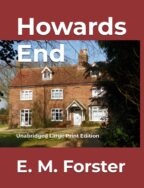 Howards End
Howards End
Unabridged Large Print Edition
by E. M. Forster
Howards End (1910) is known as a “condition-of-England” novel about social conventions, codes of conduct and relationships in turn-of-the-twentieth-century England and is considered by many to be Forster’s finest work. The story revolves around three families: the Wilcoxes, representing “new money” and global capitalism, the half-German Schlegel sisters (Margaret, Helen, and Tibby), representing the educated, cosmopolitan “New Woman” and raising questions of women’s rights and status in society, and the Basts, representing the precarious hold on life of the impoverished lower class.
Against the background of the rapid changes in the social and economic structure of England in the Edwardian period, the idealistic Schlegel sisters seek to help the struggling Basts and to show the Wilcoxes the error of their social and economic prejudices. But just as the history — and the uncertain future — of Edwardian British society’s structure and institutions are intertwined with issues of land ownership, property rights, and inheritances, the fortunes of these three families are bound to the country estate known as Howards End.
Forster based the description of Howards End in the novel on a house in a rural hamlet in Hertfordshire, his childhood home from 1883 to 1893. Known in Forster’s childhood as “Rooks Nest” the house had been owned by a family named Howard, and the house itself had been called “Howards” in their day. The house still stands today, but the estate’s lands have been partitioned and subdivided and the surrounding countryside largely developed.
This unabridged large print Edition is not an electronic scan or reproduction. The text has been formatted and edited by human editors, based on the classic original edition, and is printed on heavyweight bright white paper with a fully laminated cover.
About E. M. Forster…
E. M. Forster, (1879-1970) was born into an upper-middle-class family. Educated at Cambridge, he was a long-standing member of the Bloomsbury group of British literary figures. His first major novel, Where Angels Fear to Tread (1905), proved extremely popular, but his first major financial and critical success was Howards End (1910). Forster’s novels dealt with themes middle-class life and its values and class distinctions and and hypocrisy in British society. His final novel, A Passage to India (1924), examined the lack of understanding between ethnic and social groups in the British Empire.
In the 1930s and 1940s Forster became a regular broadcaster on BBC Radio, and an active advocate for individual liberty, penal reform and opposition to censorship. He continued to make public and television appearances through the 1950s and into the 1960s, passing away at 91 in 1970.
Product details
Publisher: S. M. Holden (March 19, 2024)
Language: English
Paperback: 467 pages
ISBN: 978-1717403926
Item Weight: 2.27 pounds
Dimensions: 7.44 x 1.06 x 9.69 inches

